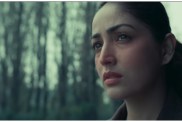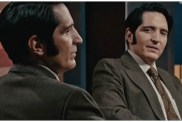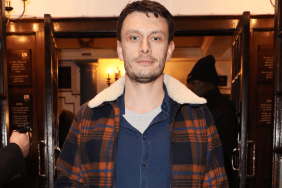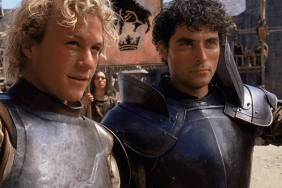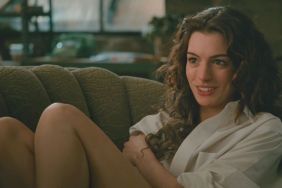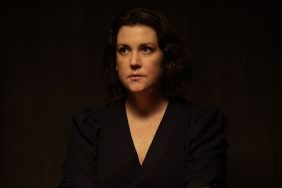Political hot topics have often been the perfect fodder for documentary filmmakers, which is why we’ve seen so many films about war, our environment, the economic collapse and the government. Lee Hirsch’s Bully, which premiered at the 2011 Tribeca Film Festival as “The Bully Project,” takes a look at a topic that’s been around for ages but only recently has become a huge national issue. If you can’t figure it out from the title, it deals with the subject of bullying in schools and what it can lead to, including teen suicide.
Over the course of a single year, Hirsch followed a couple of teens who were being bullied at their school in Sioux City, Iowa, 12-year-old Alex and 16-year-old lesbian Kelby, as well as spending time with the families whose kids committed suicide after enduring incessant bullying. After finishing the film and playing it on the film festival circuit where it won a number of awards and gained distribution from The Weinstein Company, Hirsch encountered a bully of another kind in the MPAA, who decided the language used in the film, often during scenes when kids were being tortured, warranted an R-rating, essentially making the movie harder to see for the teens who could benefit the most from the experience watching it since they couldn’t see it without a parent or guardian. Harvey Weinstein’s fights with the MPAA are fairly well known at this point, but in this case, a few new players entered the arena, including 17-year-old Katy Butler, who put up an online petition that accumulated over 400,000 signatures including everyone from Johnny Depp to Justin Bieber and even a few Congressmen.
Since this conflict arose, Hirsch and others have been all over the news talking about the movie and the ongoing issue of bullying, which has helped raise awareness even while the problem with the MPAA’s resolution has still been unresolved. (UPDATE: The Weinstein Company has announced that Bully will be released unrated to theaters.)
ComingSoon.net sat down with Hirsch a couple of weeks ago to talk about the important subject of the movie and the problems they’ve had with its rating.
ComingSooon.net: This is a very different movie from your previous doc “Amandla!: A Revolution in Four Part Harmony,” so what got you rolling on making this?
Lee Hirsch: It is different from “Amandla!.” It’s one of those things where as you’re trying to come up with what is your next film and where do you want to sort of throw yourself in the deep again, which “Amandla!” was. It was like a 10-year journey. This was something that I just had it here. (points to heart) I had developed it at various points in the last 10 years and I was like, “I just don’t know how to do this. I can’t figure it out. I don’t know if I’m really willing to confront that part of my own narrative where I was bullied.” It just kinda hit a point where I was like, “Okay, this is the movie for me; I have to make it.” I tend to overcompensate with my work, so I’ll shoot lots of experts and I’ll shoot all kinds of things that I think will cover until I know that I have a story, then those things sort of fall away in time. I think with this we started more broadly and then kind of found our voice and our vision as we got into production and realized the incredibly moving narrative velocity of these families and kids.
CS: I think that’s the general nature when you do documentaries where you shoot as much as possible and then pare it away, so it must have changed from the original vision. Was there something in the news that got you on track to start doing a movie on bullying?
Hirsch: No, it’s just that I was bullied, and so I thought that there was a film there for me as a filmmaker that I had emotional connection to that I could really understand and dig into and create something really compelling and honest and moving and beautiful. Once we decided, I could see how much it started to kind of become a national issue not long after we started, but in other words, we didn’t stat it, because it was becoming a zeitgeist. We were already doing it and then it sort of started to become more and more of a dominant national conversation.
CS: I’m curious about that because obviously I was a kid once too and I had bullies, but it just seemed to be a part of going to school and I don’t remember it driving any kids to suicide.
Hirsch: I think kids have been committing suicide from bullying from a long time, I think they just didn’t call it that; I think they didn’t make the connection as clearly. A lot of suicides aren’t even called suicides. Typically in the past they would call it something else or it was at the family’s discretion. Nowadays, part of what’s happening is if someone commits suicide, the kids in the school have been going on Facebook or Twitter and saying, “Holy geez, it was just yesterday that kids were shoving him around and calling him a fag.” Suddenly, the narrative emerges in a way that no one can sort of predict. Like you can’t control it, and we learn about the bullying by the kids themselves almost, so that’s something that’s really, really different.
CS: So the internet has really changed the face of bullying due to Twitter and Facebook.
Hirsch: Well, yeah, I mean, so there’s cyber bullying, which is different from when we were kids, but what I was thinking was also more of the positive. People are using Facebook to share stories and be like, “How do we explain this crazy, horrible loss that we don’t know how to contextualize?” Then the narrative emerges organically, yeah.

CS: Did you just start by finding the families of people whose kids who had committed suicide first and then started shooting around their schools?
Hirsch: We started shooting different kids that we sort of found through blogs and Ellen’s show actually helped us connect to Kelby and her family. Then, at around the same time we were negotiating and we got really lucky and were able to get access into the Sioux City schools to shoot for a full school year, and that’s how I met Alex. We saw him and I figured he’s probably bullied and we started to get to know him and his family for about two months. Then different families we met through news. Ja’meya’s story was a breaking news story that we had gotten involved with, but was a very different perspective.
CS: How did you approach Alex’s family to say, “Hey, I want to cover this”?
Hirsch: What I do and I’ve always done this is I don’t ever shoot when I meet people right away. We’ll get together. We will talk, often have a meal together and share about what we’re trying to do and what I’m trying to do and kinda create an understanding because I don’t think of like, the families of the kids in this film just purely as subjects. I more think of them as like, partners because of what is really asked of them it’s huge to let you into their life and I think with a documentary like this, there has to be some kind of shared vision. So, with Alex we talked a lot about bullying and what he feels and would he want to be in a movie and what would that mean?
CS: This is all off-camera?
Hirsch: All of it. Then you sort of build a rapport. Like, with “Amandla!,” a lot of the people in “Amandla!” I got to know over long periods of time, so by the time your cameras were rolling, there was already an intimacy or a sort of trust. With “Bully,” it was so different because I chose to be my own DP and shoot it myself, so that created another level of closeness, I think, where everything was very instant. There was no lighting. I shot on the Canon 5D Mark II, so it was very immediate and low impact. I think that also helped a lot.
CS: I read somewhere that you were actually not monitoring the sound while you were filming.
Hirsch: I wasn’t. You can’t on that system.
CS: Okay, so if you needed to be shooting stuff from 20 feet away
Hirsch: I’d have a long lens, yeah. A lot of things in the movie I didn’t know I had until we were in the edit room.
CS: And it was just you and one other person?
Hirsch: Typically, (producer) Cynthia (Lowen) would help with sound a lot and sort of the production side of stuff. Sometimes it was just me. I traveled alone and just did everything, so it was really lean and mean.
CS: When you spent so much time with a kid or a family, how do you keep from getting too personally attached? Obviously, it must’ve been very hard in a situation like this when you’re capturing a kid being bullied on camera?
Hirsch: Well, it was really nice to more fully develop our relationships once the film was done. We’re really close right now, all the families are all so close to each other. I mean, families would say, “You’re welcome to stay here. We have an extra room,” ’cause we were poor. It was a low budget film and we were just, “Absolutely not.” We’d sort of keep a line about not accepting invitations. You are close, but you’re also still a journalist. I mean, you get close, but you also have to keep that distance. It’s a hard thing to explain.
CS: What about with the families of kids who committed suicide? How much time did you end up spending with them?
Hirsch: Well, it was different with the Longs and I actually filmed five families that lost kids for this film and there are only two in the movie. With the Longs, we did spend a lot of time, days and days and days as they were preparing for their town hall meeting. Of course, we explored other things with them that aren’t in the film. We shot a lot, and you just get to know them and they were really supportive and really welcoming and wanted their story to be told. The harder one was the Smalleys because I met them on the day of their son’s funeral, which was really very, very, very emotional talking with them, and I didn’t have any experience with how to approach that. We just sort of spoke very few words and he said, “I’m glad you’re here and do what you need to do. What do you need?” I said, “I need you to wear a wire.” He said, “Okay.” He put it on, and then I didn’t talk to him again until the very end of the day. He came up to me and he took the wire and mic off, he handed them to me and said, “Now go hurry up and make this film and don’t take too long because people need this and I’m done now.”
CS: The parents knew that this was something which had to be out there for people to understand. I ask a lot of documentary filmmakers this, but when you’re shooting something that’s clearly wrong, how do you stop yourself from stepping in and becoming part of the movie? In this case you did step in and reported something you saw, so was that a hard decision to make?
Hirsch: I mean, it was hard not to intervene in the moment, but at that point, Alex and I really had an understanding with each other and he knew I had his back and he wanted people to see and know what he goes through every day. I think he was probably relieved that someone was there to see it.

CS: So that was something you discovered while you were in the editing room?
Hirsch: No, that was immediate and he said we could share that footage with his family and with the school.
CS: I’ve seen the movie twice now and I really don’t understand how this can get an R-rating at all.
Hirsch: I know. It’s crazy.
CS: If there were F words in there, they must have gone by so fast I didn’t notice, but It’s become this story, not only because it’s become another battle in the war between Harvey Weinstein and the MPAA, but more people have gotten involved in fighting against the decision.
Hirsch: Well, I think it’s less about Harvey’s fight than it is about the more people catch onto it, the more they’re outraged and feel like this is important and this is a moment and that kids are taking this argument. Kids are leading the fight. I think Harvey understood the power of fighting the MPAA, but none of us could have predicted this sort of groundswell of organic response and pure activism that’s risen up as a result of it. Like Katy Butler, it’s just extraordinary, a 17 year old that started this petition. It has nothing to do with us. It just happened and it was completely amazing.
CS: Something that’s crazy about the rating, especially in this case, is the audience you really need to reach are people in their teens, who aren’t the audience who would normally go see documentaries, but they need to see this movie. Usually when a movie is rated R that they want to see they might sneak in, but this isn’t one where they’d do that. Have you tried showing the movie in schools and the R-rating prevents that? Is that an issue?
Hirsch: I think we’re beginning to sort of have that fall-out. There are whole districts that are planning on bringing their schools and kids to see the film and they’re anxiously awaiting a resolution here, and we believe that the MPAA will capitulate.
CS: I have to imagine they will. Most movies about the Holocaust would be R-rated due to the nature of what they show, but that’s something that has to be part of an education about history.
Hirsch: “Titanic” has nudity, and “Gunner Palace” had 50 something uses of the F-word. They’re in a difficult situation because they claim that they are scientific and unbendable, but they bend all the time, so they don’t have a leg to stand on other than yet they’ve decided to stop this film.
CS: It’s almost a moral issue at this point, because you would think anyone who sees this movie would understand why this movie is important to get there to as many people as possible without a rating limiting that. It’s strange that NATO would also be fighting against that.
Hirsch: It’ll be interesting to see if theater owners are just like, “We don’t care. We want to support this film.”
CS: I know in a couple days you’re doing a big screening in Washington with Harvey and reps from the MPAA there, which may help matters. One of the things I was curious about while watching the movie was if you ever approached any of the kids doing the bullying to talk and explain why they’re doing it?
Hirsch: I just decided it wasn’t their narrative. They have a big enough voice in society.
CS: I think that one thing we really don’t understand when leaving the movie is how bullying can get so out of hand.
Hirsch: Yeah, I don’t know. I just felt like it was really important to just be in the world of it and experience it from the perspective of kids and families that are dealing with it. It just didn’t feel like, “Let’s understand the bullying.” It just felt like I wanted to tell a really pure story and a really honest story. The stories that you meet the kids and the families you meet in the film; the insights that you learn are what they have access to.
CS: Did you personally get some more insights and learn from the experience watching them? Does it make any more sense to you why they do it?
Hirsch: No, I mean, it does. I don’t know. I mean, it’s funny because you see some of the bullies when they get disciplined and they look like perfect, sweet kids and then you see them being absolute tormenters. I think that I learned a lot more about the capacity of the kids in the middle, the sort of bystanders, to be agents of change. That I really understand now in a different way than I ever did. I don’t have a great sense of the pathology or the psychology of what makes a bully, but that’s okay because my film doesn’t speak as an expert, it just tells a story.
CS: So I guess for young people who see this movie, I’d assume you’d want them to step in and say or do something about the problem rather than be bystanders and for parents, it’s generally to be more aware of what’s going on?
Hirsch: I think it’s about hearts and minds. I think it’s a movement film that has a very simple call to action, which is that you can be the difference and you can be the change and everything starts with one. Stop bullying, speak up. There’s lots of deeper ways that people can engage through our website and our various platforms and youth partnerships and blah, blah, blah. At its core, if we can just get people to make a choice, that tomorrow they’re going to do things a little differently. They’re going to look out for someone in the hallway, or they’re going to be more on top of it if they’re an administrator or a teacher. They’re going to follow-up and make sure that thing got taken care of. All those little millions of actions, to me, compound into a groundswell of change.
CS: But is this something that has to be dealt with on a government level?
Hirsch: Actually, I think there’s a lots of opportunity for government to engage, but I think that you can’t really legislate compassion or empathy. I think you have to drive it and inspire it so that’s where I think our film and efforts with Lady Gaga and others can come powerfully into the conversation.
CS: What have you been working on since finishing this?
Hirsch: I’m just doing this all the time. It’s a full-time job. I mean, we’re building a huge movement. We have 25 national partners. We want to show this film to seven million students – sorry, one million students in the United States.
CS: Seven million would be nice too.
Hirsch: Seven million would be great. I’ll take one. We’re working really hard on the outreach and engagement side of the film and just promoting it and sort of building this movement.
CS: Great, thanks a lot.
Hirsch: Thank you for your support and for watching my first film.
Bully opens in select cities on Friday, March 30.

